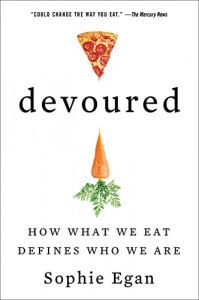“No One OutPizzas the Hut”
What does that say to you? Does it refer to taste? The dining experience? Carry out or delivery? It says it all. It’s baked into the whole pie by taking a noun (pizzas) and converting it to a verb (out pizzas).
 Here’s another noun to verb conversion: “cheffing.” Sophie Egan, in her book, Devoured: How What We Eat Defines Who We Are, cites innovation consultant Michael Barry. To Barry, “cheffing” is directing your order, (even in a limited way, like at Subway). It’s about “not feeling like a cog in a machine.” It’s about the fast-casual consumer gaining control, seeing who makes your food, what kind of treatment it receives, and even freshness. Cheffing is loaded with meaning.
Here’s another noun to verb conversion: “cheffing.” Sophie Egan, in her book, Devoured: How What We Eat Defines Who We Are, cites innovation consultant Michael Barry. To Barry, “cheffing” is directing your order, (even in a limited way, like at Subway). It’s about “not feeling like a cog in a machine.” It’s about the fast-casual consumer gaining control, seeing who makes your food, what kind of treatment it receives, and even freshness. Cheffing is loaded with meaning.
Linguists call the creation of verbs from nouns, denomination. The rest of us call it “verbing.” Research it. You’ll feast on a multi-page search buffet of hashtags and links explaining, probing, defining, praising and damning verbing.
Verbing is more Elizabethan than Epicurean (despite the examples). One authority is David Crystal, who diffuses all things Shakespeare. In a 2016 essay, he explains how Shakespeare repeatedly utilized verbing to great effect.
The verb neologisms in the plays are some of Shakespeare’s most powerful linguistic creations – and it is worth noting that large numbers of them started out in life as nouns. Indeed, this method of coining new verbs is so frequent, it’s almost as if he saw every noun as having a potential verb lurking inside it. No, ‘lurking’ isn’t right. ‘Bubbling’ would be better. The metaphor here needs to be dynamic, to suggest repressed activity beneath the surface, just waiting for a context to release it, like the burst of energy which comes when you uncork a bottle of champagne.
 Daniel Honan cites the research of Philip Davis, a Professor of English Literature at the University of Liverpool. Davis conducted neurolinguistic experiments finding that Shakespeare is the master in eliciting the “wow effect,” the P600 response, which in part comes from verbing, which is “unpredictable and interesting.”
Daniel Honan cites the research of Philip Davis, a Professor of English Literature at the University of Liverpool. Davis conducted neurolinguistic experiments finding that Shakespeare is the master in eliciting the “wow effect,” the P600 response, which in part comes from verbing, which is “unpredictable and interesting.”
In other words, Matt Damon, he scienced the you know what out of it.
Shakespeare and the Elizabethans lexi-coined thousands of new words by verbing. Why? If you want the long answer, look to the hundreds of authors that explain the period, the plays, and the people. But here’s a tidy why.
Chi Luu in JSTOR Daily says,
“denominal verbs are extraordinary—they act as vivid linguistic shortcuts. By just converting a noun to a verb, unique information is conveyed (and enriches the language with new rhetorical imagery). This works because if you know the properties of the noun, you can quickly determine the likely meaning of the verb.”
And verbing may be even more important today. She continues, “Verbing thrives in a fast-paced, short attention span internet culture…” Short attention span?! Are you still here?
Though this be madness, yet there is method in’t
When you’re eyeballing that meme or billboard, ear-holing that audio, and asking yourself why did I notice? Look for a denominal verb. Some are more power-packed than others. Experts have defined and explained them; however, doing doesn’t demand defining. If you’re writing, try verbing. But, don’t overchef it!
Fun with Verbing:
Verbing Weirds Language https://www.gocomics.com/calvinandhobbes/1993/01/25
The Verbing Man (from 1887) http://itre.cis.upenn.edu/~myl/languagelog/archives/003970.html
- Derby Cars and Critics Both Race to the Bottom. But Your Leadership Must Not. - October 5, 2023
- Are you overlooking something that’s holding you back? How my “aha!” moment could help. - September 14, 2023
- What Spartan Women Can Teach Us About Advertising - October 12, 2022

